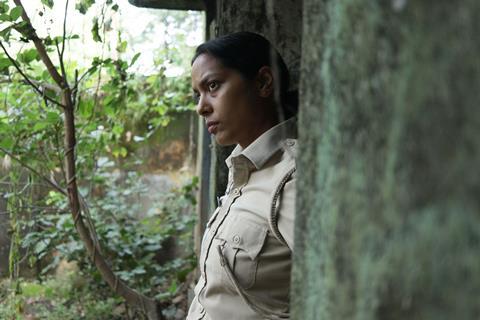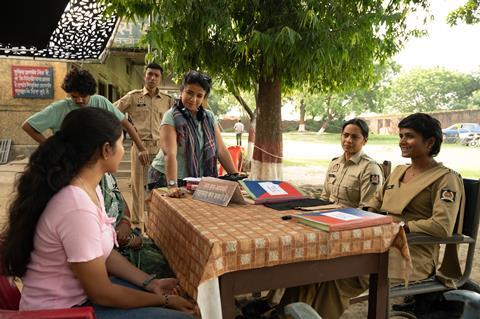The UK’s international feature Oscar entry is fresh off two wins at the BIFAs.

It was a simple photo that provided a way into the story of Santosh for first-time feature director Sandhya Suri. Recently back in the UK from India, where she had been researching the scourge of violence against women, which was to be the subject of her debut feature, Suri came across a picture of two protesters confronting a policewoman at a demonstration following the 2012 rape and murder of 23-year-old Jyoti Singh in Delhi.
“I spent a lot of time with various NGOs,” says the British-Indian filmmaker, who was a Screen International Star of Tomorrow in 2023, “but every time I picked up the camera, it felt very intrusive. These two women in the photo were almost spitting at the policewoman but she had an enigmatic expression. She’s them but she’s not them, she has the uniform and power but she’s a woman. There was so much complexity at that moment, and I decided she was the one to tell this story.”
The knotty neo-noir police procedural stars Shahana Goswami (Zwigato, A Suitable Boy) as Santosh who, when her police officer husband dies, is offered his job thanks to a government initiative to help widowed police spouses. The job brings her financial relief, a sense of identity and a taste of power. But when a young woman is raped and murdered, it also exposes the corruption, sexism and prejudice running through every level of law enforcement.
Produced by the UK’s Good Chaos, India’s Suitable Pictures, France’s Haut et Court and Germany’s Razor Film, with backing from the British Film Institute, BBC Film, ZDF/ARTE and CN, Santosh premiered in Un Certain Regard at Cannes and is sold internationally by mk2 Films. It is the UK’s official submission for the international feature Oscar, and will be eligible for other categories thanks to Metrograph Pictures’ US release on December 27.
Santosh was also nominated for four awards at the British Independent Film Awards, winning best screenplay and breakthrough producer for Balthazar De Ganay and James Bowsher at the ceremony on December 8. (Mike Goodridge and Alex McAlex are also producers of the film.)
With a $2.5m (£2m) budget, Santosh filmed over 44 days between August and October 2023 in and around the city of Lucknow, Uttar Pradesh. Suri was determined to shoot in as many live locations as possible, and got her wish thanks to her Indian producers who devoted time and effort to getting permits to access streets and markets in sensitive areas. It meant the production, which used predominantly local crew, had to navigate torrential rain in the first week of shooting as well as sweltering heat.
“This is an ambitious first feature with crowd scenes, stunts, things you don’t really want to do on a debut,” says Suri. “I kept wishing I was doing a quiet coming-of-age drama in northern England! There was constant stress but I’m glad we went for the harder option. In the hotel we used in one scene, I asked permission to shoot from the people who were living there, rather than get extras, so it felt very genuine.”
Solid anchors

Suri’s non-fiction background helped in the transition to narrative features – she made her name with documentaries I For India, which competed at Sundance Film Festival in 2006, and 2018’s Around India With A Movie Camera, which used archival British Film Institute footage to explore life in British India.
“There are so many choices you have as a fiction maker,” says the filmmaker. “But it was also about doing a lot of documentary forensic research and working with police anthropologists, so I felt very solid in my anchors.
“Documentarists are like archaeologists, always digging for what’s underneath,” she continues, “and having a good bullshit detector gave me confidence about knowing what was right and what was believable and what wasn’t. Those things kept me grounded.”
Suri took a different path when it came to the look and tone. “I didn’t want a documentary style, a veracity,” she says. “It was more about a very careful mise-en-scène, having that rigour about the shots and the form, and also about being very immersive in the sound and the feel. The level of detail and observation is what I wanted in terms of the style. I wanted it to be very organic while being precise and cinematic.”
That also informed her decision to not have a score. “We had a lot of discussion over that because people get nervous [about the lack of a score],” she says. “During the edit, we had a lot of debate over whether there was enough tension without a score in the scenes where Santosh is following the suspect. At Cannes, I noticed the audience leant into the film during those scenes, and I think not smothering it with music helped that.
“I love working with sound; it always comes first,” she continues. “I worked with the sound team before we went to India to [work out how to] bring the dynamic through the sound, to not have a constant blanket of noise, when to take it away and when to ramp it up.”
Starring alongside Goswami is Sunita Rajwar as Sherma, a morally compromised police officer who takes Santosh under her wing.
“The heart of the story was always going to be the relationship between a young officer and an older, experienced officer,” says Suri. “It’s about having a complex mentor-mentee relationship between women. Sherma remains so unknowable. At the end of the film, Sherma says there are two ways to be a woman in India – a woman like her or a stay‑at-home woman living with in-laws who don’t love you. But the film says there can be a third way to be a woman.”
The story’s themes might strike a particular chord with Indian audiences, but Suri was always adamant the film should have a further reach.
“Santosh was intended to be 100% crossover, which is very hard to do, especially in a film dealing with such complex issues,” she says. “But I have a lot of faith in audiences. There are things an Indian audience will understand that a western audience might not, but it won’t impact on their involvement. It’s been in cinemas for more than two months in France and is a big hit with 150,000 admissions. And France doesn’t have a strong relationship with India.”
At the time of writing, Indian distribution is close to being signed. “I would love for it not to open up a very polarised discussion,” says Suri. “I hope it holds a mirror up and provokes some thinking. Because everything in the film is so casual – the casual violence, the casual caste-ness, the casual misogyny, the casual Islamophobia. Those themes are in the tapestry of the film because they are everywhere. That it’s been chosen by the UK as its foreign-language Oscar entry is huge – there’s been a lot of press about having the UK, the former coloniser, submit a Hindi-language film.”
Suri is now working with BBC Film on an adaptation of a JG Ballard dystopian love story – “Ballard’s work has been handled by men quite a lot and I’m excited about bringing some emotion to the work” – and a project with Santosh producer Balthazar de Ganay, which might be TV or film. “I’m happy to work in whatever medium the story dictates.”

























No comments yet